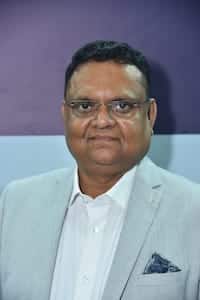Power electronics involves the control and conversion of electricity using electronic devices. Mohammed Zeya WASE , Group Manager – Technical Marketing and Application, Power Discrete and Sub Analog Group – India, STMicroelectronics in conversation with Sudeshna Das, consulting editor, EFY Group, at electronica India 2022 explains ‘How the use of innovative semiconductor materials and demand for innovative applications are going to drive the power electronics sector.’

Q. What are the trends which are going to drive innovation in the power electronics industry?
A. A lot of things have changed in the last few years. There have been three major changes in the semiconductor industry. The first two being the increase in the processing speed and a significant decrease in the cost. The third one is the availability of low cost sensors without compromising innovation. Having said this, when you have these three ingredients – where you have power systems, sensors, and processors, it helps you integrate innovations like Artificial Intelligence to the power systems. Now major change is the enormous power demand due to increased use of electrical and electronic appliances, there is a need for energy-efficient motors and Power systems. There is also a need for high Power density so we can develop systems which are miniature in size and with higher efficiency. These three changes are going to drive innovation in the power electronics sector as now we have what I call a power system with a brain. Moreover, there is a trend of innovations of alternative materials over traditional Silicon. Like Gallium Nitride (GaN), Silicon Carbide (SiC) etc. We have gained significant experience in wide bandgap (WBG) materials through silicon carbide (SiC) MOSFETs and SiC diodes, and now we are talking about smart power integration with the development of gallium nitride based devices. So big change has already started
Q. Why will the new semiconductor materials be more effective for the power electronics sector?
A. The very high electron mobility of GaN material allow devices with very low on-resistance and exceptionally high switching frequencies, which are key advantages in the design of next-generation products, especially those for electric vehicles and renewable energy applications. GaN-based high-electron-mobility transistors (HEMT) can deliver major gains in terms of efficiency and power density in circuit topologies involving the high-frequency operation and low on-state resistance. This is especially true in the lower voltage and lower power application ranges involving significantly higher switching frequencies. When we talk about SiC which outperforms conventional silicon (Si) devices in power electronics for Electric Vehicles (EVs) , and industrial applications like solar panel to meet the need for power modules with smaller form factors or higher power outputs, higher temperature operation , and very high voltage sustainability.
While silicon-based devices are predominantly used in today’s power electronics, next-generation power electronics are expected to be using more and more Wide-Bandgap materials like silicon carbide (SiC) owing to the better characteristics for power systems. With higher energy efficiencies and smaller form factors, SiC power devices can yield energy savings in several key systems inside EVs such as the traction inverter (the “engine” of an EV), on-board chargers, and DC-DC converters (which power headlights, interior lights, wiper and window motors, fans, pumps, and many other systems from the main high-power source, after conversion to a lower voltage).
Q. How does STMicroelectronics plan to facilitate the customers with innovative products?
A. Whenever there is a new emerging technology or a product, it is crucial to understand its applications and gain technical know-how. At ST, we are creators and makers of semiconductor technologies, devices, and solutions that start with our employees, our customers, and our thousands of partners. Together, we design and build products, solutions, and ecosystems that address the challenges our customers are facing while helping them seize opportunities.
We thoroughly test our products before making them accessible to the customers. We develop applications around those products so that customers can use those applications and develop their own products. In India, we have a design center and dedicated application teams which support customers, including enterprises and startups during their journey from scratch.
Q. What are the recently launched innovative products of STMicroelectronics for the Indian market?
A. Let us start with a very innovative product called the wireless charger. It will come very handy in the future . We also have a 65-watt laptop charger which is extremely energy efficient in small form factor. Here, GaN can improve the form factor by a very huge margin.
In the Indian market, the demand for inverter air-conditioners is increasing. An inverter air conditioner uses a BLDC motor inside. It requires precise control of the motor and due to this the power consumption becomes 40-60% less than the conventional air conditioner. However, it needs electronics for that and we have introduced an innovative product for the same. We are offering intelligent Power Modules along with our STM32 Controller, for PFC section IGBT and Ultrafast diode that ensures the optimum performance of a BLDC motor in an air conditioner.
We have also introduced a 5-Kilowatt system for the e-rickshaws. The energy in this motor comes from the Battery .
For any motor control solution we provide most of the active semiconductors along with software library of the motor controller to our customers as well to shorten the design cycle . This is all backed by our reference design and support from our System lab and Competence Center.






